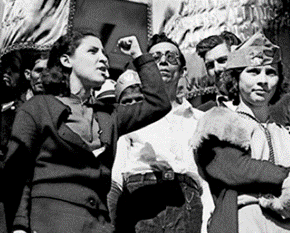|
|
|
|
The weekly newsletter of the México Solidarity Project |
|
|
|
March 9, 2022/ This week's issue/ Meizhu Lui, for the editorial team |
|
The Joy of Sisterhood: Women Rule the Days |
|
Yesterday, March 8, communities around the world celebrated International Women’s Day.
Men, I could complain, don’t need a special “day” to celebrate themselves. They run the show, after all, the other 364 days of the year. Or I could quote the famed African-American author Zora Neale Hurston: “Women are the mules of the world.” Yes, all true. But we have another truth as well: Women have always had, every day of the year, their own ways of celebrating each other. |
|
Look at this photo of Emma Tenayuca, the subject of a film by Anne Lewis, the documentarian our Voices spotlights this week. The shot comes from 1938, the year Emma led striking Mexicana pecan shellers who faced police brutality and intense anti-immigrant, anti-communist hysteria. |
|
|
Even amid that terrifying battle, these women could find delight in being together. We can feel, from the photo, their joy as they march arm-in-arm, their love for one another. Emma may have been chosen as strike leader as much for her compassion as her bravery.
Over a half-century later, at the 1995 Beijing Women’s Conference, like-minded women turned the streets into a marketplace. But this would be no standard capitalist enterprise. Women from poorer countries were marketing their own creations because they needed to find a way to pay for their travel. They made shopping an act of international solidarity! European women donned brightly colored caftans to replace their urban black. African women tried on traditional Mongolian deel.
These women didn’t have to speak the same language to let each other know “you look terrific”! Amidst gestures and laughter, fashion became a bonding language for women engaged in serious dialogue on how to raise women’s status.
The power of women doesn’t come from the same kind of “leadership” that male-dominated societies generate. Women’s power resides in kitchens, gardens, laundromats. The joy of sisterhood brightens our days — and connects us worldwide. |
|
|
|
Don’t miss an issue. Subscribe to the weekly México Solidarity Bulletin! |
|
|
|
|
The Tale of a Beloved — and Re-Loved — Organizer |
|
Anne Lewis comes out of a movement to make media that create opportunity for social change. Documenting the lives and struggles of working people, particularly in rural Appalachia, her award-winning films illuminate their grit, courage, and creativity. Lewis brings to the foreground the stories of those usually in the background. Descriptions of her many films appear on her annelewis.org website. |
|
|
Anne Lewis: As a rebellious 18-year-old, I fled to México, where I first recognized — in a very different part of the continent — the vitality of rural communities. Later, I was living in rural Appalachia, where, in the early ’90s, Mexican workers began showing up in large numbers to work on corporate farms and in small factories.
These Mexican workers suffered attacks from white workers — a Head Start center for preschool migrant children was burned to the ground — and I saw how the global economy pitted workers against each other. I wanted to explore what’s possible in terms of international solidarity. That resulted in the film Morristown: in the air and sun, a working-class critique of globalization that ended with a union victory at a chicken-processing plant in east Tennessee.
When I moved to Texas, I wanted to document oral histories. A friend clued me in to the pecan workers’ strike. The workers in this historic labor event had been ignored and shamed because they were brown and the organizers were communists. |
|
What situation did the pecan workers face?
As one of the former pecan workers told me, “Pecans are good to eat but hard to shell.” The struggle centered in San Antonio where women, men, and children as young as ten were doing the shelling. |
|
|
Photo: lisc.org |
|
Other shelling worksites had mechanized, but the Southern Pecan company found it cheaper to de-industrialize, They gave pecans to contractors who farmed the work out to Mexican and Mexican-American workers, who labored in shelling shacks or at home at all hours of the day and night. The workers made 6 cents a pound. But then the company slashed the wage to 4 cents with no warning. The workers’ indignation boiled over. At least 10,000 people went out on strike.
Their struggle became more than a strike. It was an uprising, coming from community outrage at the discrimination and super exploitation these workers were facing.
Was Emma Tenayuca a pecan worker?
No. Her grandfather had taken her to hear speeches by veterans of the 1910 Mexican Revolution, including communists and anarchists. The spark caught fire in her. She joined striking women cigar workers at the age of 16, and the violent repression of those strikers, including her own arrest, solidified her resolve to stand with workers. She joined LULAC, the League of United Latin American Citizens, but quit because they didn’t allow in immigrants. Emma’s family had been in the US for many generations, but she saw Mexicanos as Mexicanos, regardless of which side of the border they came from. |
|
Emma joined the Communist Party in 1937 and found her calling: organizing Mexican workers into Unemployed Councils, a Communist Party strategy to radicalize and mobilize the unemployed. She became well-known, beloved even, for her fiery speeches and uncompromising defense of working people. Based on that reputation, the pecan workers elected her to lead their strike. She was all of 21! |
|
|
Photo: The Zinn Education Project |
|
Striking workers would go on to be beaten, harassed, and tear-gassed. Emma herself was jailed several times. Later, people would ask her if she had been afraid. Her answer: “I never thought in terms of fear. I thought in terms of justice.”
Emma had three strikes against her: a woman, a Mexicana, and a Communist. How did those identifications affect her?
During the Depression years of the 1930s, Mexicanos took much of the blame for US unemployment. Deportations soared. It was a particularly hard time to win any white allies. In that political moment and with women becoming directly involved in struggle, the white patriarchs of industry and San Antonio’s officials united against Emma.
Workers also faced merciless red-baiting that stirred up priests, politicians, the police, and common thugs against them. Emma’s Communist Party affiliation would finally lead to her getting run out of San Antonio. Blacklisted, physically and spiritually exhausted, she left Texas for San Francisco, where she became a teacher. She didn’t return to Texas for more than 20 years.
When she returned, people expected her to take her position again as a radical firebrand — but she didn’t.
On one hand, some put Emma on a pedestal as a labor saint. On the other, some criticize her for ending her political activism after leaving San Antonio. But Emma was a woman, a real human being. She had a right to live her own life, rather than fulfilling the expectations of others. Isn’t that what it means to be liberated and in control of your own life?
What impact did Emma have on other women?
Today, Emma is being re-claimed by women, particularly the women of San Antonio. Her image appears all over murals, second only to the Virgen de Guadalupe! When I made the film, mostly only veterans of the strikes of the 1930s remembered her fondly. But Emma has now become an inspiration once again to an entire new generation of women activists. And Texas needs Emmas more than ever! |
|
|
Antonia Darder: Honoring Women Who Dare to Dream |
|
The Puerto Rican teacher, academic researcher, and cultural activist Antonia Darder has long been a promoter of Paulo Freire’s pedagogy of liberation. Besides authoring books on how to democratize public education, Darder has also written many articles and editorials, made a documentary, performed her own songs, exhibited paintings, and written poetry. What can’t she do! We highlight here one of her most memorable poetic efforts. |
|
|
We Are
We are of the generation of women who ventured beyond boundaries; who embraced the body, who relished passion. who dreamt of justice.
We are of the generation of women who rejected the narrow limits, who trampled on conformity, who spat on subjugation, who dreamt of freedom.
We are of the generation of women who transgressed the holy scriptures, who dared to speak, who caressed untouchables, who dreamt of deliverance.
We are of the generation of women who endured the cursed punishments, who wrestled fears, who defied solitude, who dreamt of liberation. |
|
|
Recent news reports and commentaries, from progressive and mainstream media,
México sees 2nd major win for independent unions, Associated Press. Says US Rep. Bill Pascrell: “The dominos are falling against the corrupt ways of the past.”
Mexican President against invasions, censorship, and black lists, MercoPress. As a country that has been invaded, by the US in 1914, “we cannot accept” any more invasions, López Obrador tells reporters, not “from Russia to Ukraine or from China to another country nor from the United States to any other country.”
México will not send arms to Ukraine, president says, Reuters. AMLO: “We don’t send guns anywhere. We are pacifists.”
Migración brindará refugio a ucranianos que lleguen a México por conflicto con Rusia, El Financiero. Francisco Garduño Yáñez, comisionado del Instituto Nacional de Migración, asegura que también habrá atención personalizada a ucranianos para resolver sus estancias en México.
Slim defiende a AMLO y pide a cúpulas respetar su gobierno democrático, Polemón. En un diálogo con el presidente saliente del Consejo Coordinador Empresarial, el magnate Carlos Slim Helú defendió al actual gobierno de López Obrador, por lo que le pidió a las cúpulas empresariales dejar a un lado el conflicto ideológico que tienen con el mandatario.
Susan Ferriss and Joe Yerardi, As guest workers increase, so do concerns about wage cheating, Center for Public Integrity. Labor Department investigations haven’t kept pace with the increase in demand for workers.
Clara Zepeda, Empresas en las bolsas pagaron dividendos récord, La Jornada. Impulsados por los sectores bancario, minero y consumo discrecional, las empresas mexicanas que cotizan en la bolsa pagaron dividendos récord en el 2021. |
|
|
The Mexico Solidarity Project brings together activists from various socialist and left organizations and individuals committed to worker and global justice who see the 2018 election of Andrés Manuel López Obrador as president of México as a watershed moment. AMLO and his progressive Morena party aim to end generations of corruption, impoverishment, and subservience to US interests. Our Project supports not just Morena, but all Mexicans struggling for basic rights, and opposes US efforts to undermine organizing and México’s national sovereignty.
Editorial committee: Meizhu Lui, Bruce Hobson, Bill Gallegos, Sam Pizzigati, Courtney Childs, Victoria Hamlin, Agatha Hinman. To give feedback or get involved, email us! |
|
|
|
Web page and application support for the México Solidarity Project from NOVA Web Development, a democratically run, worker-owned and operated cooperative focused on developing free software tools for progressive organizations. |









